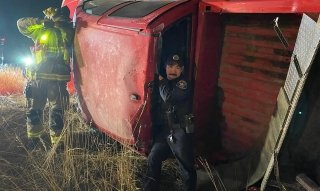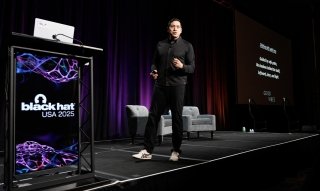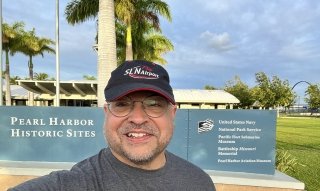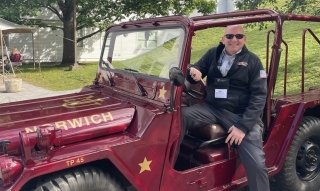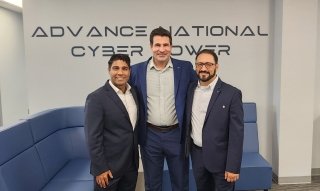Thomas Mease
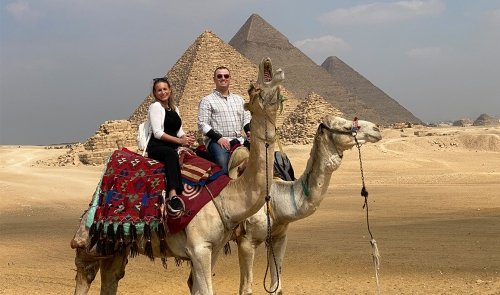
For me, the biggest thing was the interaction with the faculty. They provide individualized feedback, advice, and concern for every student. Norwich makes online students feel just as valued as those attending classes on campus.
Tell us about yourself; what’s your role? Have you already completed a degree?
I am currently an instructor at the Recruiting and Retention College at Fort Knox, KY, for the Guidance Counselor Operations Course. I have been an active-duty service member for just over 15 years. In 2019, I completed my Bachelor of Arts in Cultural Anthropology from Ashford University and began the long process of deciding on a graduate school that would support my career goals and work with the demands of my everyday life.
What degree program are you pursuing?
I am currently in the final year of my Master of the Arts in Military History program at Norwich University.
Is there any particular reason you were drawn to that field?
As a child, my father and grandfather were very adamant and passionate about the importance of understanding and learning from history. From a young age, I loved reading and learning about history, and as a child/grandchild of military veterans, I was particularly drawn to military history. My own career and experiences in the Army only further solidified my passion for learning about the history of warfare and all the facets of history that surround it.
What is your favorite event that you have studied in all of history?
That is a truly difficult question. When I first started studying history, I was hyper-focused on the subjects that I was exposed to by my father and grandfather. So, I started out obsessed with the Korean and Vietnam conflicts. As I developed my personal interests, the American Civil War became my passion as I felt it was such a unique and dynamic aspect of American culture and our military history. Through my studies, I must say my favorite topic to research and analyze has been World War II. When examining the concept of total warfare and the influence of industrialization on the evolution of warfare, World War II stands out as one of the most impactful conflicts in history. It has shaped everything from military policy and strategy to the world economy and political atmosphere. There was really no aspect of life that was unaffected by the war.
How did you decide where you selected to attend your degree?
For me, selecting my graduate school came down to three key factors: my specialized interest in military history, researching the curriculum at the universities that offered such a specialty, and discussing the reputation of universities and their impact on my career prospects with those already working in the career fields I want to enter upon my retirement from the Army.
Not many universities offer a military history major, so this narrowed my search significantly. It came down to two universities that I felt had a curriculum that interested me and supported my long-term career goals: Citadel and Norwich University. I liked the opportunity to further specialize my program through Norwich University by selecting a degree plan that focused on 19th and 20th-century American military history. However, I was hesitant to select Norwich because I was unfamiliar with the university and had grown up in the Carolinas, being very aware of the Citadel. The final decision came down to my discussions with various historians and museum curators who were currently working at places like the Metropolitan Museum in New York, the Antietam National Battlefield, and various other historical sites and museums. I was impressed with how they spoke of Norwich University and its history program and was convinced that it was the better program for what I was trying to achieve.
Have you attended many colleges?
My undergraduate work was done primarily through Ashford University, but I did take some in-person courses at Clemson University and Armstrong Atlantic State University (now Georgia Southern University Armstrong Campus). I have also done graduate work at the University of Louisville, where I intend to finish my secondary master’s program in Education. Each university has had its different experiences and strengths, but Norwich has by far been the school that I have enjoyed the most and been challenged the most by.
What would you say to someone who is concerned about the challenges involved in a master’s program?
First, I would say that the challenges are not insurmountable. If it is something that is important to the student, it is a very achievable undertaking. It does require time management and the appropriate prioritization of tasks, but with the right mentality and support it is an enjoyable experience. I would also say that a certain degree of discomfort is a good thing. Graduate school should be challenging and push you to new limits, it isn’t (or shouldn’t be) meant to be easy. Take the challenge as an opportunity to grow and self-develop. It can be scary at times, but the reward at the end is more than worth it. Finally, remember that the reward itself is the education and knowledge, not just the degree you get.
As an online student, have you ever felt like you were second class or felt left out of campus activities?
At some of my previous schools, I felt like the online programs were a bit ostracized. You might receive emails about campus events, but it was almost like you got caught in the wrong email chain, as they never intended to include you. Norwich has been a completely different experience. The faculty and staff are very involved with the students’ education and their everyday life and career pursuits. The university has online webinars with scholarly guest speakers, informational sessions with school faculty, and online students are always invited to attend campus events if possible. For me, the biggest thing was the interaction with the faculty. Professors don’t just check the block and give the same feedback to every student. They provide individualized feedback, advice, and concern for every student. This is something that I have found to be lacking in other universities. Norwich makes online students feel just as valued as those attending classes on campus.
As an online student, are you planning on attending graduation in person? Why or why not?
ABSOLUTELY! I did not have a strong desire to attend my undergraduate program’s graduation in person. Mostly because I never felt all that connected with the university or my fellow students. However, my experience at Norwich has left me enamored with the school, and I am so proud to become a Norwich alumnus. I also feel that the small class sizes and the specialized degree have left me sharing many of my classes with the same peers throughout my program. We have developed bonds and connections as we discuss the coursework and have continued to network as part of our career pursuits. I am very excited to be able to visit the campus and attend graduation in person.
How important is class size in a master’s program? Why?
Class size is crucial, especially in a writing-heavy graduate program. Smaller class sizes allow for more focused attention from the professors, more detailed feedback on assignments, and a better class environment with peers. Most of my classes at Norwich have between 10 and 15 students per class. Because of this, the professors have been able to interact heavily during discussion posts with each student and foster peer-to-peer learning. In a program where discussion responses are usually a thousand words, and papers are ten or more pages, it is vital that the professor be able to thoroughly analyze the writing assignments to provide useful feedback. The smaller class sizes allow them to do that in a very expedient manner.
As an online student, did you feel like you had enough access to your professors?
In my previous experiences with online learning, I don’t think I had a single conversation of consequence or received detailed feedback from any of my professors. Since coming to Norwich, I have been blown away by the access to and involvement of the faculty. And it started right away. I will never forget getting my first phone call from Dr. John Broom the week before I started my first class. He called to get to know me, discuss my goals, and explain his teaching philosophy. He told me to save his number and contact him directly if I had any questions or just wanted to discuss history. I have had this same experience with all my university professors and other faculty members. Dr. Lisa Mundey and Dr. Mark Grotelueschen were the same way and played a major part in my individual education and love for the university. And it isn’t just the professors. My academic advisor, Toni Grout, and the VA representative, Shaun McCaughey, are always available and have made the whole process of pursuing my degree, registering for classes, and using my military benefits stress-free and seamless.
How has your school helped you prepare for your thesis?
The Norwich faculty started preparing me for my final thesis from the very first week of the program. Dr. Broom had individual conversations with every student about what topic they were considering and the challenges that may come with it. Through every course I have taken, each professor has continued to follow the development of my thesis topic and progress while providing insight and advice along the way. I have even had conversations with the program director and the associate dean of the history department regarding the topic. Even the way the curriculum is designed helps support your thesis development. Every course forces you to build your skills and scholarly research toward your final goal while refining your topic to support the final assignment better.
Have you had anything unexpected happen that you would like to share about your experience?
During the third class of my degree plan, my wife’s health started to decline rapidly. As the doctors were struggling to figure out why her organs were shutting down, I was trying to keep my head above water with my schoolwork. It finally came to a point where I decided I needed to drop my class despite being in the 8th week out of the 11-week course. I contacted my academic advisor, Toni Grout, and explained my situation. I asked how I could drop the course without affecting my GPA and explained that I understood there was no way to recoup the GI Bill benefits I had used for that course. Ms. Grout was extremely empathetic and told me that she needed to make a few calls and would get back to me as soon as possible. Within 30 minutes, she called me back and said my program director wanted to speak with me regarding the situation. I then received a phone call from Dr. Broom that I would have never expected. He called me with such concern and care that it would have seemed that he personally knew my wife and was heartbroken over her circumstances. He then explained to me that he and the associate dean, Dr. David Ulbrich, had put together a plan to allow me to pause my course without dropping it and give me an extra 90 days to complete the coursework at my pace. Furthermore, it would not require the use of any additional GI Bill benefits as it was still the same course. Over those first 90 days of the extension, my wife’s situation continued to worsen, and doctors Broom and Ulbrich continued to support me, as well as my professor, Dr. Grotelueschen. I received frequent calls to check on my wife and me and encouragement regarding my coursework. For nearly six months, Norwich University and its faculty helped me deal with my responsibilities as a husband and caregiver while looking out for my academic well-being. I was finally able to dedicate my full attention back to my coursework. Not only did I complete that course, but I was also able to learn and put forth the level of effort I expected from myself. I could only do this because of the tremendous support of Norwich’s faculty and staff. The level of care that I received was beyond imagination as professors and other faculty called to offer prayers, support, and encouragement. This was crucial to not only my education but my overall mental health. I am forever grateful to Norwich University for upholding and living the values at their foundation.
Why did you decide to use your GI bill while still serving instead of waiting until you retired?
There are two main reasons. First, like most graduate schools, the cost of tuition could not be fully covered using Tuition Assistance alone. I wanted to ensure that I could complete this graduate program without incurring any debt, so the GI Bill allowed me to do that. Most importantly, I believe this graduate work is crucial to my ability to successfully transition out of the Army into a civilian career I am passionate about. I didn’t see the point in waiting until I was retired and having to wait to pursue my next career all so I could receive the housing allowance from my GI Bill. Using it now allows me to start planning for my transition and focus on what comes after I take the uniform off.
What is one thing you learned so far that you believe you might not have elsewhere?
The most unique part of my experience at Norwich has been the mentorship and learning that occurs outside the regular curriculum. The one-on-one discussions with the professors and my peers about everything from course material to personal reading lists and even advice for becoming a working historian after graduation. This information is not something that I believe I would have received at most other universities. It is a credit to Norwich and their professors that so much is invested in the total development of a well-rounded professional historian. It isn’t just about getting a degree or a university collecting tuition; it is a true learning experience to make the student into a peer historian capable of contributing to the field.
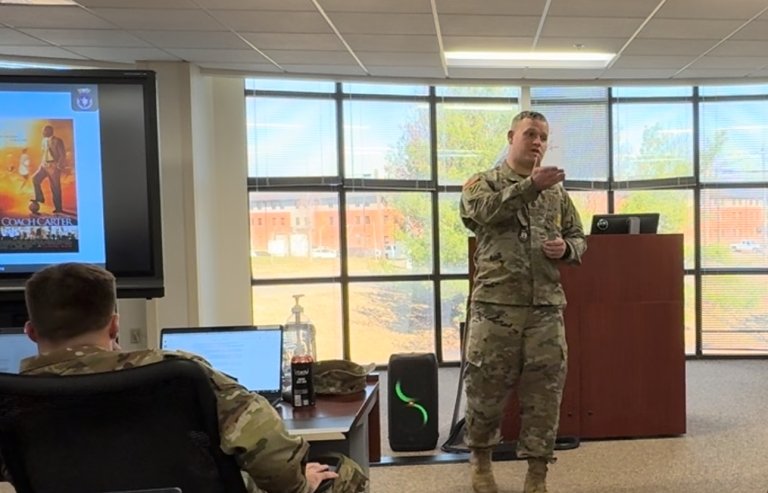
How user-friendly is the online experience?
I find the online learning environment at Norwich University to be extremely user-friendly. Prior to starting your first class, they enroll you in a required introductory course that shows you all of the areas necessary for navigating the online classroom, library, email, and messaging features. They also offer webinars and direct access to library staff to assist in scholarly research and refining your research skills. Everything the student needs is in one convenient area that remains consistent throughout each course.
In your opinion, are service members well equipped to pursue a master’s degree? Why or why not?
I believe that service members are uniquely equipped for graduate studies. Especially senior enlisted and commissioned officers. Attention to detail, planning, time management, and the ability to excel under pressure are advantages that service members, especially leaders, have when they begin their graduate work. These are not common traits among most non-service members, as our experiences and training have forced us to develop these skills. Furthermore, service members are trained to accomplish a given mission and can be self-motivated regardless of circumstances. This is necessary for success in a challenging and fast-paced graduate program, where the student is responsible for their own success and gets out of the program what they put into it. One disadvantage that I believe service members have entering master’s degree programs is that their task-oriented nature can sometimes leave them short-sighted when selecting a graduate degree or university. Too often, service members are looking for what program is the fastest or easiest way to complete any degree to support their military career progression. However, it is imperative that we, as service members, think more long-term. How will this degree benefit you when you are no longer wearing the uniform? What are civilian agencies looking for when they hire a new employee in that career field? Simply looking at graduate school or any college learning as a means for progressing our military career rather than an opportunity to diversity, grow, and prepare for life after the military is a downfall unique to service members preparing for graduate school.
Is there anything else you would like to share about your experience?
“There is no time for ease and comfort. It is the time to dare and endure.” - Winston Churchill
“The quality will remain when the price is forgotten.” - Henry Royce

